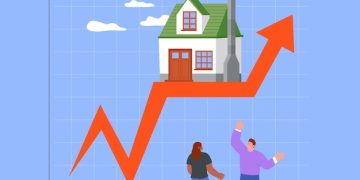Mortgage rate predictions: what to expect going forward

Anúncios
Mortgage rate predictions depend on various factors, including economic conditions, inflation, and actions by the Federal Reserve, which ultimately influence borrowing costs for homebuyers.
Mortgage rate predictions play a crucial role in informing potential homebuyers and homeowners. Curious about what’s on the horizon? Let’s dive into the factors that shape these rates and how they may impact your decisions.
Anúncios
Understanding current mortgage rates
Understanding current mortgage rates is essential for anyone looking to buy or refinance a home. Rates fluctuate frequently, influenced by various economic factors. Keeping an eye on these trends can save you substantial amounts of money over time.
What Factors Influence Current Mortgage Rates?
Several key elements play a role in shaping today’s mortgage rates. The federal funds rate, inflation, and the overall economic environment are just a few of the variables affecting what lenders charge for loans.
- Federal Funds Rate: Changes in this rate set the tone for borrowing costs across the economy.
- Economic Indicators: Reports on inflation, employment, and GDP growth can all impact rates.
- Bond Markets: Mortgage-backed securities and treasury bonds help determine lenders’ willingness to extend credit.
The condition of the housing market also significantly affects mortgage rates. When demand for homes is high, rates may rise as lenders adjust their prices. Conversely, if fewer people are buying, you might see a drop in rates as lenders try to attract customers.
Anúncios
Why Is It Important to Track Mortgage Rates?
Tracking current mortgage rates allows you to make informed decisions about when to buy or refinance. With small shifts in rates, you can either miss out on savings or secure a better deal for your loan. Monitoring rates regularly can also prepare you for when it’s best to lock in a rate.
Additionally, being knowledgeable about the rates could help you negotiate better terms with your lender. You’ll be well-positioned to find the best possible financing option that suits your needs.
In summary, understanding current mortgage rates is vital for anyone considering their options in home financing. By staying informed and knowing what influences these rates, you can make decisions that save you money and align with your financial goals.
Factors influencing mortgage rate predictions
Several key factors influence mortgage rate predictions, making it essential for potential homebuyers to understand them. These factors shape the landscape of home financing and can significantly impact the cost of borrowing.
Economic Conditions
The overall state of the economy plays a crucial role in determining mortgage rates. When the economy is strong, demand for loans increases, which can push rates higher. Conversely, during economic downturns, rates may decrease to stimulate borrowing.
- Inflation: Higher inflation often leads to increased mortgage rates as lenders adjust to maintain profitability.
- Employment Rates: Low unemployment levels typically drive demand, influencing rate increases.
- Consumer Confidence: When people feel optimistic about the economy, they are more likely to buy homes, increasing rate pressures.
Another factor to consider is the actions of the Federal Reserve. The Fed sets the federal funds rate, which indirectly affects mortgage rates. For instance, when the Fed raises rates to combat inflation, mortgage rates often follow suit, impacting affordability for homebuyers.
Market Trends
Trends in the housing market also affect mortgage rate predictions. A competitive housing market can lead to higher rates due to increased demand. When more people are looking to buy homes, lenders know they can charge more. Additionally, the availability of homes for sale can influence rates; if inventory is low, prices and rates may rise.
Understanding these dynamics can better prepare you for making informed decisions about your mortgage options. By keeping track of these factors, you’ll be in a solid position when it comes time to secure your financing.
Historical trends in mortgage rates

Understanding historical trends in mortgage rates can provide valuable insights for potential homebuyers. Analyzing past rates helps to identify patterns and anticipate future movements, making it an essential aspect of financial planning.
Key Historical Trends
Over the past several decades, mortgage rates have experienced significant fluctuations. For example, rates were notably high in the early 1980s, peaking at nearly 18% as inflation soared. Homebuyers faced tough decisions, often leading to lower home sales during that period.
- 1980s: High rates due to inflation and economic instability.
- 1990s: Gradual decrease in rates as inflation stabilized.
- 2000s: Low rates to stimulate housing market recovery after the dot-com bubble.
As we moved into the 2010s, rates continued to remain low, reaching historic lows around 3% in 2020 as the Federal Reserve took measures in response to the economic impact of the COVID-19 pandemic. These low rates significantly boosted homebuying activity.
Understanding Rate Movement
Mortgage rates typically move in relation to the yield on 10-year Treasury bonds and other economic indicators. When investors expect strong economic growth, they may demand higher yields, which can drive mortgage rates up. Conversely, during economic uncertainty, rates often decline as investors seek safer assets.
Historical data shows how external factors such as government policies, inflation rates, and unexpected economic events can influence mortgage rate trends. For those looking to buy homes, understanding these trends provides context and aids in making informed decisions regarding financing.
What experts say about future mortgage rates
What experts say about future mortgage rates can vary widely, but most agree that understanding current trends is critical for potential buyers. Analysts often look at economic indicators and market patterns to form their forecasts.
Expert Opinions
Many experts assert that interest rates will continue to rise gradually as the economy recovers. This perspective is grounded in the belief that increased demand for housing will push rates upward. Additionally, the Federal Reserve’s actions to combat inflation are expected to influence future mortgage rates.
- Inflation Trends: Experts closely monitor inflation, as high rates may lead to higher mortgage costs.
- Employment Rates: Strong job growth can signal increased demand for homes, impacting rates.
- Consumer Behavior: Changes in buyer confidence can affect housing demand and, subsequently, mortgage rates.
Additionally, some specialists predict that technological advancements in the mortgage industry could introduce more competitive rates. Online lenders and digital platforms often have lower overhead costs, which can drive rates down. The landscape of mortgage lending is evolving, and these dynamics play a crucial part in future forecasting.
Diverse Predictions
It is important to note that predictions can differ among experts. Some believe that geopolitical events could introduce volatility in the market, while others maintain that rates will stabilize over the long term. Understanding these various viewpoints will better equip homebuyers to navigate the financing landscape effectively.
Keeping updated on what experts are saying about future mortgage rates is vital. Doing so can help you anticipate changes and make informed decisions when it comes to purchasing or refinancing a home.
Tips for locking in a good mortgage rate
Knowing how to lock in a good mortgage rate can save you money and provide peace of mind during the home-buying process. There are several strategies that can help you secure the best rate available.
Timing Your Lock
Choosing the right time to lock in your rate is crucial. Monitor mortgage rates regularly to determine the best moment. When rates are low or dropping, it’s a good time to consider locking in. Many lenders allow you to lock in a rate for a set period while you finalize your loan details.
- Market Trends: Stay informed about economic news that may affect rates.
- Rate Lock Period: Understand how long your lock will last and whether you can extend it.
- Watch for Changes: If rates start to rise, locking in sooner rather than later can be beneficial.
Another tip is to get pre-approved for your mortgage. This not only shows sellers that you are a serious buyer, but it also gives you a clearer picture of your borrowing capabilities and desired rate.
Negotiating with Lenders
When discussing mortgage rates with lenders, don’t hesitate to negotiate. Ask about different rate options, including points that may lower your overall rate. Your credit score, loan type, and down payment can all influence your final interest rate.
Additionally, consider shopping around and getting quotes from multiple lenders. Each lender may offer different rates and terms, so comparing them can help you find the best deal available. A small difference in rates can lead to significant savings over the life of your loan.
Finally, ensure your financial documents are in order when applying for a mortgage. Having your income statements, credit history, and other important documentation ready can smooth the process and help you secure a more favorable rate sooner.
In summary, understanding mortgage rates and the factors that influence them is crucial for making informed decisions when buying a home. By staying updated on current trends and expert opinions, you can navigate the mortgage market with confidence. Remember to consider timing, negotiate with lenders, and prepare your financial documents to secure the best rate possible. With the right approach, you can lock in a favorable rate and save money over the life of your loan. Happy house hunting!
FAQ – Frequently Asked Questions about Mortgage Rates
What are mortgage rates?
Mortgage rates are the interest rates charged by lenders for borrowing money to purchase a home. They can fluctuate based on various economic factors.
How can I lock in a good mortgage rate?
To lock in a good mortgage rate, monitor market trends, negotiate with lenders, and secure pre-approval for your mortgage.
What factors influence mortgage rates?
Factors that influence mortgage rates include economic conditions, inflation, employment rates, and actions taken by the Federal Reserve.
Why is it important to understand historical mortgage rates?
Understanding historical mortgage rates helps buyers identify patterns and trends, allowing them to make informed decisions when securing a mortgage.





